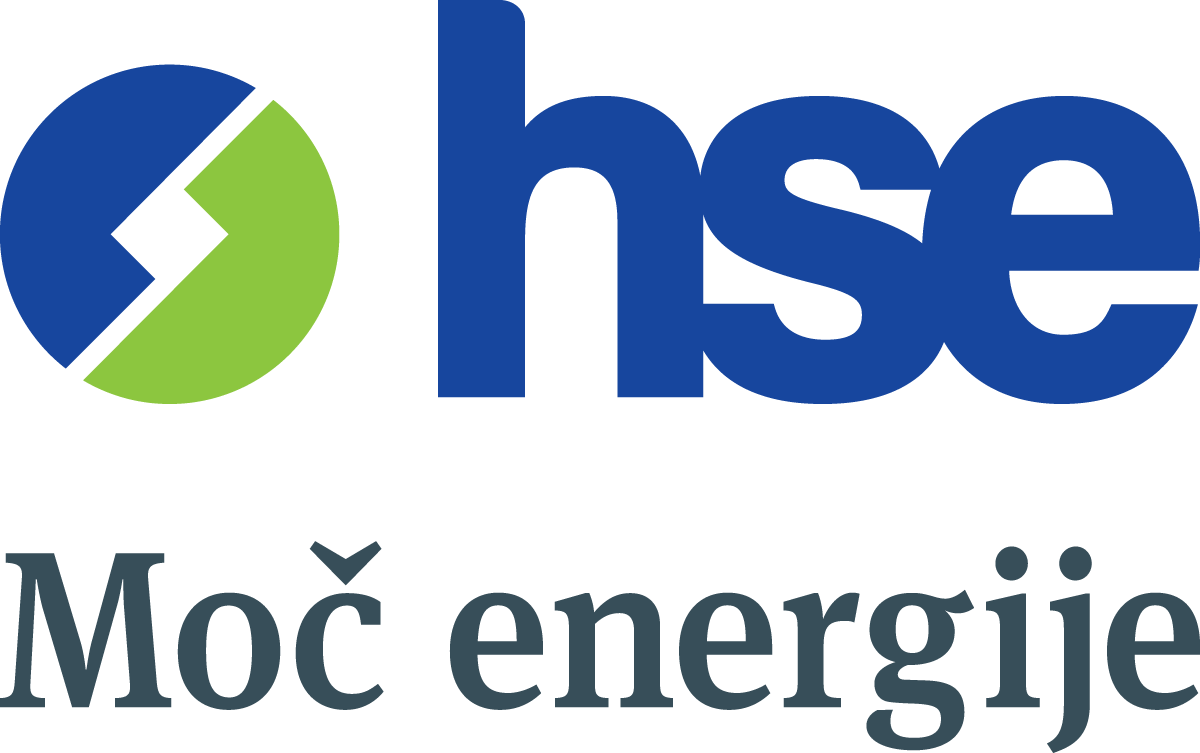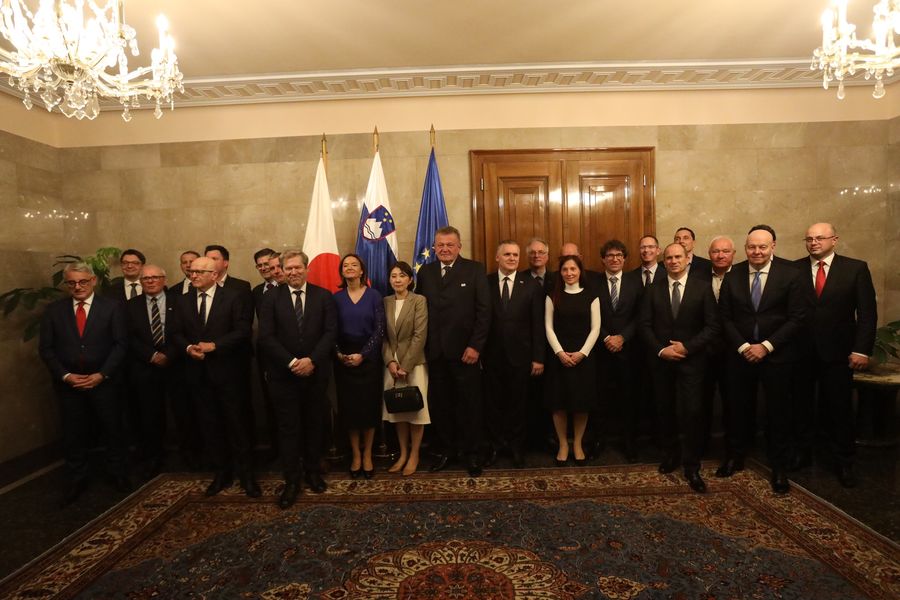Today, eighteen companies, organisations and municipalities signed a consortium agreement for the establishment of a hydrogen ecosystem from low-carbon sources. Their efforts in cross-sectoral integration when establishing the hydrogen value chain from low-carbon sources were supported in Slovenia by the Ministry of Foreign and European Affairs, the Ministry of the Environment, Climate and Energy, the Ministry of the Economy, Tourism and Sport, and the Ministry of Higher Education, Science and Innovation.
On the occasion, Dr Tomaž Štokelj, the Managing Director of HSE, stated, “The HSE Group is the largest producer of electricity from renewable sources in Slovenia and our vision is to become the spearhead of the country’s green transition. Green hydrogen is certainly one of the energy products of the future, and this is included in our development plans. We are the leading partner in the international project, North Adriatic Hydrogen Valley, which includes the entire value chain of green hydrogen use, from its production from renewable sources, storage and distribution to its final use in various sectors. Today’s signing of the consortium agreement to establish the green hydrogen ecosystem represents for us another important partnership in the attainment of strategic objectives in the field of green transition and an important step towards a carbon-free society. We look forward to successful cooperation with all project partners.”
Numerous activities aimed at obtaining the objectives of the green energy transition and ensuring a low-carbon future are taking place in Slovenia at the local and national levels. Hydrogen is becoming increasingly prominent as a possible central medium for the transformation and storage of energy from low-carbon sources, which can then be used in the energy and transport sectors or industry. To accelerate the introduction of hydrogen as a sustainable fuel of the future, the Japan-Slovenia Business Council, the Slovenian Academy of Engineering and ELES set up a consortium of stakeholders with similar interest and plans.
Today, eighteen companies, municipalities and organisations solemnly signed the consortium agreement for the establishment of a hydrogen ecosystem from low-carbon sources. In doing so, they were also supported by the Ministry of Foreign and European Affairs; the Ministry of the Environment, Climate and Energy; the Ministry of the Economy, Tourism and Sport; and the Ministry of Higher Education, Science and Innovation. The consortium is probably the strongest established in Slovenia so far as it has access to more than 6,500 experts from various fields and several decades of experience in industrial engineering.
The Director of ELES, mag. Aleksander Mervar, stated in his opening address that one year and a half had passed since he expressed his intention to the then President of the NEDO Agency to set up a consortium for hydrogen technologies in Slovenia in order to find a Japanese partner who could apply for NEDO grants. Mervar added that he had obtained an encouraging reply, but a clear message that everything depended on us. “After visiting Tokyo in November 2022, my idea was based on activities consisting of several steps. The first was to compose a strong Slovenian consortium which would link up with a potential Japanese partner capable of applying for NEDO tenders. This would be followed by the signing of an agreement between the consortium and the Japanese partner. The final step would be the implementation of one or several demonstration projects. With the signing of the consortium agreement, today’s event concludes the intermediate step that began last June,” Mervar concluded.
The promotion of hydrogen technologies and incorporation of hydrogen into the future energy system is also supported by the state. To this end, the attendees were addressed by Tanja Fajon, Deputy Prime Minister and Minister of Foreign and European Affairs; mag. Bojan Kumer, Minister of the Environment, Climate and Energy; Matjaž Han, Minister of the Economy, Tourism and Sport; and Dr Igor Papič, Minister of Higher Education, Science and Innovation. Each from their own perspective, they emphasised the importance of hydrogen as a necessary vector for utilising surplus electricity from decentralised renewable energy sources, enhancing cross-sectoral cooperation, ensuring a successful green transition and meeting the commitments to reduce greenhouse gas emissions.
Tanja Fajon, Minister of Foreign and European Affairs, commended the establishment of the consortium for the production and use of green hydrogen and an ever-closer cooperation between Slovenia and Japan, which is reflected in the fact that Japanese companies are currently the largest Asian investors in Slovenia: “We know that such joint projects exceed mere economic interest. They promote new connections in many fields, seek solutions for our common challenges and deepen the trust between countries. The partnership brings together Slovenia and Japan in the economic field but also with regard to numerous global issues and participation in organisations such as, for example, the UN Security Council during this year when both countries are currently non-permanent members.”
Minister Kumer stressed the significant role that hydrogen will play in the coming decades, particularly in the decarbonisation of the economy. He highlighted the cross-border North Adriatic Hydrogen Valley project, which can significantly contribute to the development of the hydrogen industry. “New technologies, especially those linked with hydrogen, are a key building block in the efficient fight against climate change,” Kumer added.
On the occasion, Matjaž Han, Minister of the Economy, Tourism and Sport, underlined the importance of the energy independence of the European Union and Slovenia. “If ever, then it is now that the European Union needs strong industry. But for its functioning, reliable and sufficient energy sources are required. Energy independence is even more important at a time of geopolitical instabilities. What is more, we should be thinking in the direction of green energy as much as possible for the sake of our planet. Hydrogen is one of the crucial elements in the transition towards cleaner and more sustainable energy sources, both in energy intensive industry and in transport.”
Minister Papič highlighted that the idea about the new project with regard to hydrogen technologies was also supported by the European Commission and the Hydrogen Europe organisation. Slovenia’s wish is that partners from Japan participate in the project as well. “Hydrogen technologies are certainly an alternative for mobility, industrial use and seasonal energy storage. To this end, the Ministry of Higher Education, Science and Innovation supports projects, partnerships and initiatives in this field,” Papič explained.
The establishment of the hydrogen ecosystem can be supported by the consortium with infrastructure provision for demonstration projects, the electricity network for the transmission and distribution of low-carbon energy, the gas transmission and distribution network for mixing hydrogen with natural gas, electricity generation and storage systems, hydrogen users and other key sources. However, the consortium lacks a partner with production capacities for hydrogen equipment and the technical expertise to help make the hydrogen ecosystem a reality. The consortium thus recognises opportunities for continuation of excellent cooperation between Slovenian and foreign partners and for the development of international projects in the field of hydrogen technologies, which can serve as an example for EU member states and other countries around the world after a successful implementation in Slovenia.
Consortium for the establishment of a hydrogen ecosystem from low-carbon sources
Members
ELES, HSE, the GEN Group, Elektro Gorenjska, Elektro Ljubljana, Plinovodi, PETROL, Energetika Ljubljana, Talum, the Slovenske Železnice Group, TPV Automotive, SOLVERA LYNX, BTC, the Municipality of Ljubljana, the Municipality of Kranj, the Municipality of Ajdovščina, the Japan-Slovenia Business Council and the Slovenian Academy of Engineering.
Institutional support
Ministry of Foreign and European Affairs; Ministry of the Environment, Climate and Energy; Ministry of the Economy, Tourism and Sport; and Ministry of Higher Education, Science and Innovation.
Identified opportunities:
- Introduction of hydrogen-powered city buses,
- Introduction of hydrogen-powered utility vehicles,
- Installation of hydrogen filling stations at strategic locations for logistics and other commercial transport,
- Construction of electrolysers of various capacities with connection to the electricity transmission or distribution network,
- Construction of plants for mixing hydrogen with natural gas in the existing gas network,
- Installation of storage tanks for hydrogen or a mixture of hydrogen and natural gas,
- Upgrade or conversion of the existing gas turbines to a fuel mixture containing hydrogen,
- Installation of hydrogen-ready gas turbines for a combined generation of heat and electricity,
- Use of a mixture of hydrogen and natural gas as a low-carbon fuel for district heating,
- Use of low-carbon hydrogen in industrial processes,
- Use of low-carbon hydrogen in air transport,
- Development of a domestic low-carbon hydrogen market, etc.








